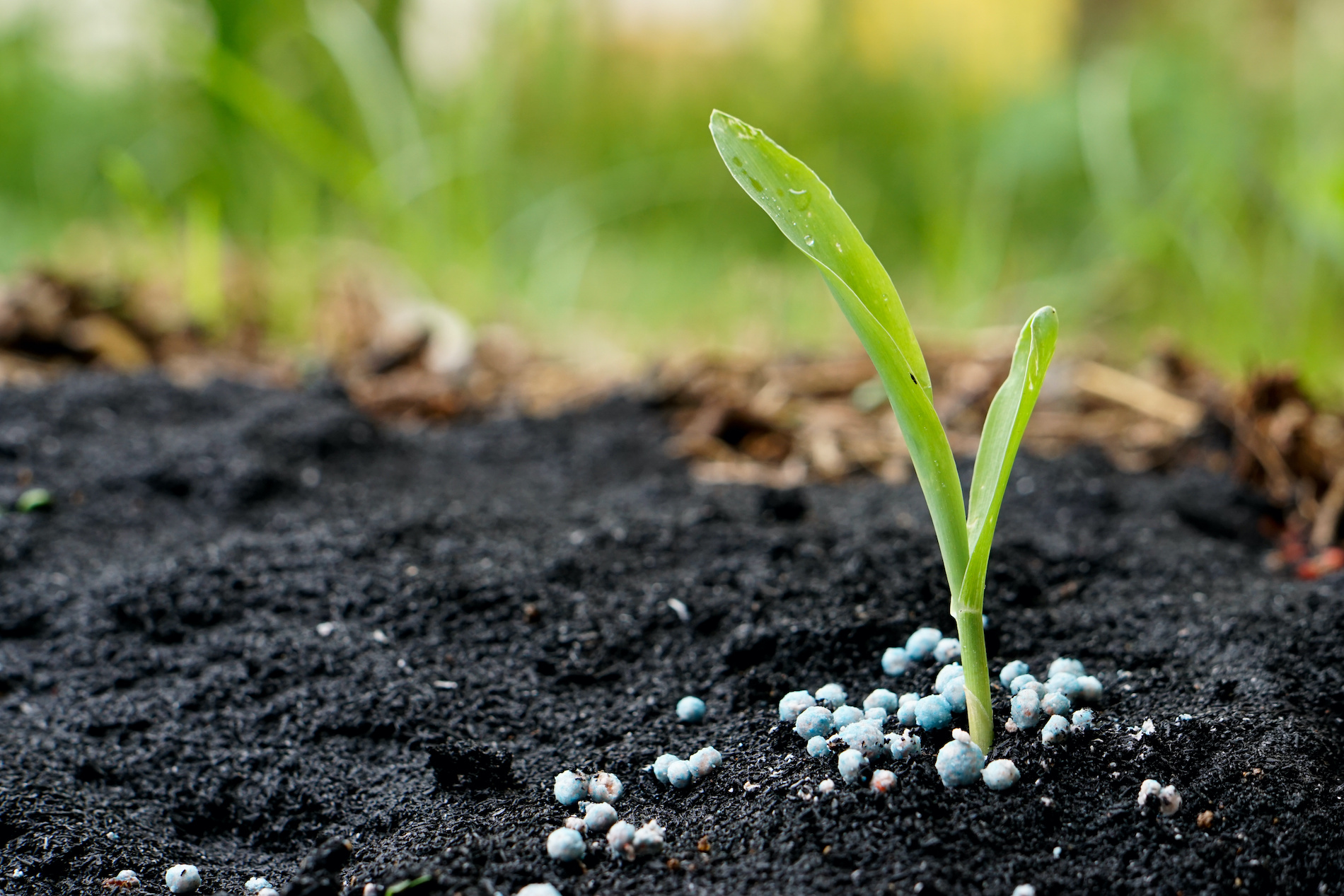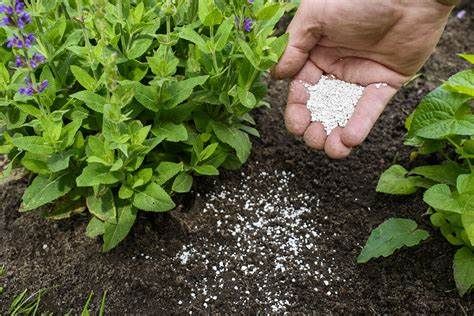Vermicompost, also known as worm compost, is an organic fertilizer made from decomposed organic wast ...
Learn about the best types of fertilizers for agriculture, including organic, inorganic, and slow-release fertilizers. Discover how soil testing helps determine the right fertilizer for your crops, ensuring optimal growth and sustainable farming practices.
सर्वोत्तम उर्वरक का चुनाव आपकी फसल, मिट्टी की स्थिति और खेती के तरीके पर निर्भर करता है। जैविक उर्वरक जैसे कम्पोस्ट और गोबर की खाद मिट्टी की उर्वरता बढ़ाते हैं, जबकि रासायनिक उर्वरक जैसे NPK फसल की तुरंत वृद्धि में सहायक होते हैं। धीमे-रिलीज़ वाले उर्वरक लंबे समय तक पोषक तत्व प्रदान करते हैं। सही उर्वरक चुनने के लिए मिट्टी की जांच आवश्यक है, जिससे पोषक तत्वों की सही मात्रा मिल सके और फसल उत्पादन में सुधार हो।इस लेख में हम जानेंगे कि कौन सा उर्वरक सर्वोत्तम होता है और किस प्रकार की फसलों के लिए कौन से उर्वरक उपयोगी हैं...
उर्वरक किसी भी फसल की उन्नति और उत्पादन में एक महत्वपूर्ण भूमिका निभाते हैं। सही प्रकार के उर्वरक का चयन करना किसानों के लिए आवश्यक है ताकि मिट्टी की गुणवत्ता बनी रहे और फसल का उत्पादन बढ़े। ।

मुख्य रूप से उर्वरक दो प्रकार के होते हैं – जैविक (ऑर्गैनिक) उर्वरक और रासायनिक (केमिकल) उर्वरक। दोनों प्रकार के उर्वरकों का उपयोग खेती में किया जाता है, लेकिन प्रत्येक के अपने फायदे और नुकसान होते हैं।
जैविक उर्वरक प्राकृतिक स्रोतों से प्राप्त होते हैं और मिट्टी की गुणवत्ता को बनाए रखने में सहायक होते हैं। इनका उपयोग करने से मिट्टी की संरचना में सुधार होता है और यह लंबी अवधि में फसल उत्पादन के लिए लाभकारी होते हैं। जैविक उर्वरक निम्नलिखित स्रोतों से प्राप्त होते हैं:
जैविक उर्वरक फसल के लिए संतुलित पोषण प्रदान करते हैं और पर्यावरण के लिए भी सुरक्षित होते हैं।
रासायनिक उर्वरक वैज्ञानिक विधियों से बनाए जाते हैं और यह जल्दी फसल को पोषण प्रदान करते हैं। इनका उपयोग तेजी से परिणाम प्राप्त करने के लिए किया जाता है। रासायनिक उर्वरकों को मुख्य रूप से निम्नलिखित तीन भागों में बांटा जा सकता है:
नाइट्रोजन पौधे की वृद्धि के लिए आवश्यक है, फॉस्फोरस जड़ विकास और बीज उत्पादन के लिए महत्वपूर्ण है, और पोटाश पौधे की रोग प्रतिरोधक क्षमता को बढ़ाता है।

जहां जैविक उर्वरक प्राकृतिक होते हैं और मिट्टी को लंबे समय तक उपजाऊ बनाए रखते हैं, वहीं रासायनिक उर्वरक त्वरित परिणाम देते हैं लेकिन इनका अत्यधिक उपयोग मिट्टी की संरचना को नुकसान पहुंचा सकता है। जैविक उर्वरक से पर्यावरण को कोई नुकसान नहीं होता, जबकि रासायनिक उर्वरकों का अत्यधिक उपयोग पानी और मिट्टी की गुणवत्ता को प्रभावित कर सकता है।
सर्वोत्तम उर्वरक का चयन फसल की आवश्यकता, मिट्टी की गुणवत्ता और पर्यावरणीय परिस्थितियों के आधार पर किया जाना चाहिए। अगर मिट्टी जैविक पोषक तत्वों से भरपूर है, तो जैविक उर्वरक का उपयोग बेहतर रहेगा। लेकिन अगर जल्दी परिणाम की आवश्यकता है, तो रासायनिक उर्वरक का संतुलित उपयोग किया जा सकता है।
यह भी पढ़ें: गाजर की खेती | पत्तागोभी की खेती
जैविक और रासायनिक उर्वरकों दोनों का अपना महत्व है। सर्वोत्तम उर्वरक वही है जो आपकी मिट्टी और फसल की जरूरतों के अनुसार चुना जाए। जैविक उर्वरक लंबे समय तक फसल और पर्यावरण दोनों के लिए फायदेमंद होते हैं, जबकि रासायनिक उर्वरक तुरंत परिणाम देने में सहायक होते हैं। सही उर्वरक का चुनाव करके आप न केवल फसल उत्पादन में वृद्धि कर सकते हैं, बल्कि मिट्टी की उपजाऊ शक्ति को भी बनाए रख सकते हैं।
कृषि से संबंधित वीडियो देखने के लिए यहाँ क्लिक करें: YouTube
Fertilizers play a crucial role in agriculture, helping plants receive the essential nutrients required for healthy growth and increased yields. However, the choice of the right fertilizer depends on several factors, including the type of crop, soil condition, and the specific nutrient needs of the plants. In this article, we will explore the different types of fertilizers and how to determine which one is the best for your farming needs.
Fertilizers are generally categorized into two types: organic and inorganic (chemical) fertilizers. Each has its advantages and disadvantages, and their use depends on the farming practices, soil, and crop requirements.
Organic fertilizers are derived from natural sources like plant and animal waste. Common examples include compost, manure, and bone meal. Organic fertilizers release nutrients slowly and improve soil structure by increasing its organic matter content. They also enhance the soil's water retention capacity and support microbial activity, promoting long-term soil fertility. Organic fertilizers are ideal for sustainable and eco-friendly farming practices, though their nutrient content is lower than chemical fertilizers.
Inorganic fertilizers are synthetically produced and are rich in essential nutrients such as nitrogen, phosphorus, and potassium (NPK). These fertilizers provide immediate nourishment to crops, allowing for quick growth and higher yields. Inorganic fertilizers are available in different formulations to meet the specific nutrient needs of crops. However, excessive use of chemical fertilizers can lead to soil degradation, reduced soil fertility, and environmental pollution over time.
NPK fertilizers are one of the most common types of chemical fertilizers, containing nitrogen (N), phosphorus (P), and potassium (K) in balanced proportions. Nitrogen promotes leaf and stem growth, phosphorus supports root development, and potassium improves the overall health and disease resistance of the plants. Balanced NPK fertilizers are suitable for most crops and are widely used for achieving optimal crop growth and productivity.
Slow-release fertilizers gradually release nutrients into the soil over an extended period. These fertilizers reduce the risk of nutrient leaching and over-fertilization. They are ideal for plants that require a steady supply of nutrients throughout their growth cycle. Slow-release fertilizers can be organic or chemical and are particularly useful for long-duration crops like fruits and vegetables.
The best way to determine the right fertilizer for your farm is through soil testing. Soil tests provide insights into the nutrient levels and pH of your soil, helping you select a fertilizer that addresses specific deficiencies. Based on the test results, custom fertilizers can be formulated to meet the exact nutrient requirements of your soil, ensuring that your crops receive the right balance of nutrients.
There is no single “best” fertilizer that suits all crops and soil types. The right fertilizer depends on the crop’s nutrient needs, the soil condition, and the farming practices. Compost and manure are great choices for organic farming, while chemical fertilizers like NPK or slow-release formulas benefit conventional farming. Soil testing is crucial in determining the most suitable fertilizer for your field. By choosing the right type of fertilizer and applying it properly, you can maximize crop yields and maintain soil health.
0
0
Vermicompost, also known as worm compost, is an organic fertilizer made from decomposed organic wast ...
Fertilizers are essential for increasing the productivity of crops and maintaining soil fertility. A ...
In the cultivation of Rabi crops, maintaining the right balance of nutrients is crucial for achievin ...
Wheat is one of the major rabi crops in India, and proper field preparation and the use of the right ...